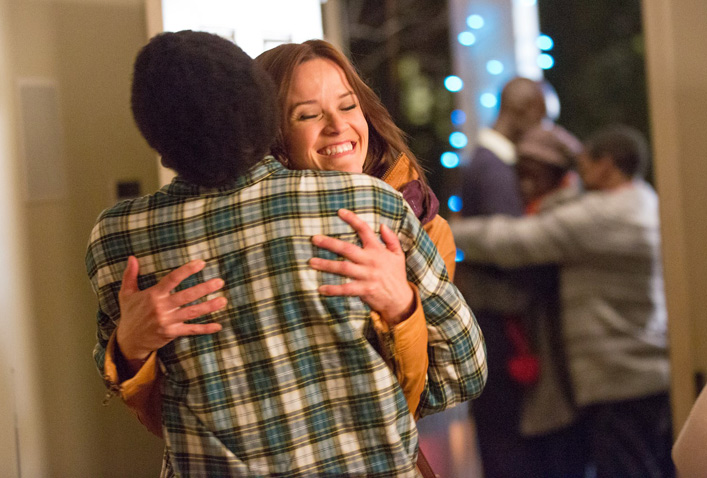
 Enter Carrie Davis (Reese Witherspoon). She’s sassy, she’s single, she has affairs with dudes in hotels and works helping refugees get work in the United States. Our protagonists’ stay in the country is contingent on getting employment in the first six months, not only to get on their feet, but to pay off the plane ticket that sent them there (if you’re looking for the film to make a comment about America’s kindness coming at a petty price, you won’t find it here). And so, jobs at grocery stores and manufacturing plants are found, but soon there are encounter very minor road bumps.
Enter Carrie Davis (Reese Witherspoon). She’s sassy, she’s single, she has affairs with dudes in hotels and works helping refugees get work in the United States. Our protagonists’ stay in the country is contingent on getting employment in the first six months, not only to get on their feet, but to pay off the plane ticket that sent them there (if you’re looking for the film to make a comment about America’s kindness coming at a petty price, you won’t find it here). And so, jobs at grocery stores and manufacturing plants are found, but soon there are encounter very minor road bumps.
There is a half-hearted, connect-the-dots feeling to "The Good Lie" that is hard to shake from the film’s opening moments. Almost taking for granted that audiences will be moved by this tale, Falardeau and screenwriter Margaret Nagle ("Boardwalk Empire") don’t do the necessary work to make the film emotionally authentic. With a rote and routine screenplay and lackluster direction, "The Good Lie" is efficient dramatic Cheese Whiz. Witherspoon, who incidentally takes a supporting role here (any Oscar focus is going to be strictly on "Wild") is told early on by her boss Jack (Corey Stoll) not to get personally invested with these refugees. But as you’ll probably guess, they both take an interest that goes beyond the minimum responsibilities of their job, and it’s vaguely justified because Carrie’s sister died of cancer, and Jack is a veteran. That’s all. And the leading characters of the movie are barely given much more texture either.
 Largely existing as Exotic Others (isn’t it so cute when they don’t know what to do with Jello desserts?) in the film, events and character development occur with little or no explanation. Mamere dreams of becoming a doctor, so one day he’s suddenly studying medical textbooks. For a person still adjusting to the basic customs and habits of American life, where on Earth did he find one? The deeply devout Jeremiah joins a church at some point during the movie, and is invited to give a mini-sermon at service, but again, we get no sense of this new community. And Paul spends most of his time in America scowling and smoking marijuana because… sadness. "The Good Lie" lazily leaves narrative and thematic gaps wide open, assuming that audiences will be swept along by the feel-goodery.
Largely existing as Exotic Others (isn’t it so cute when they don’t know what to do with Jello desserts?) in the film, events and character development occur with little or no explanation. Mamere dreams of becoming a doctor, so one day he’s suddenly studying medical textbooks. For a person still adjusting to the basic customs and habits of American life, where on Earth did he find one? The deeply devout Jeremiah joins a church at some point during the movie, and is invited to give a mini-sermon at service, but again, we get no sense of this new community. And Paul spends most of his time in America scowling and smoking marijuana because… sadness. "The Good Lie" lazily leaves narrative and thematic gaps wide open, assuming that audiences will be swept along by the feel-goodery.
And perhaps they will—there were audible sniffles in my screening—but for anyone who is even slightly discerning or has seen this kind of movie before, it’s difficult not to be cynical. "The Good Lie" knows what kind of movie it wants to be, but takes every possible shortcut to get there, to the point that it becomes a wafer thin, disposable product of little redeeming value. It’s an emotionally dishonest account of a very real, very common occurrence involving thousands of people who made their way to the United States in dire circumstances. Not only do those refugees deserve better that this film, so do filmgoers. [D]
This is a reprint of our review from the 2014 Toronto International Film Festival.

